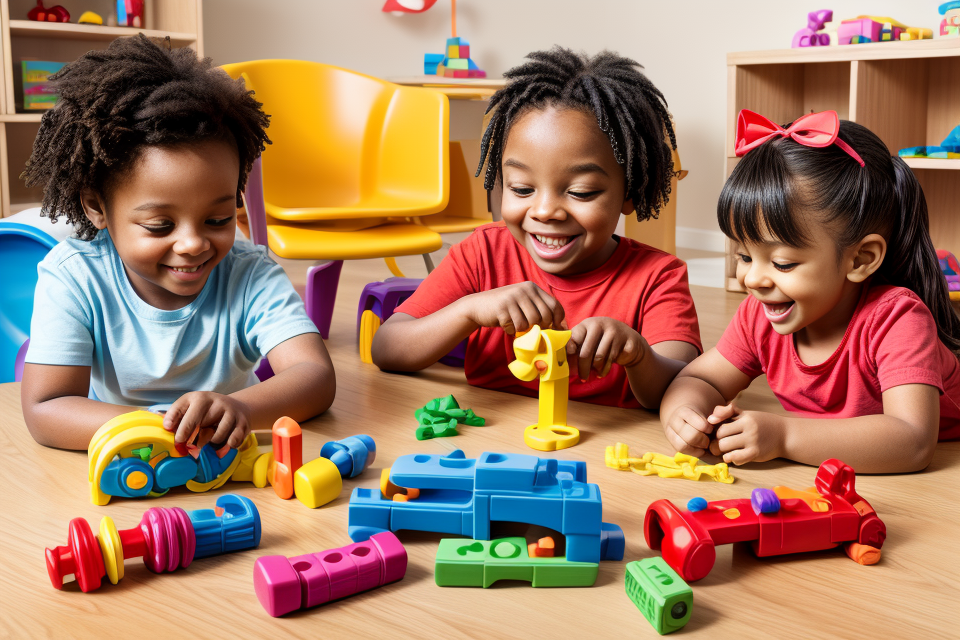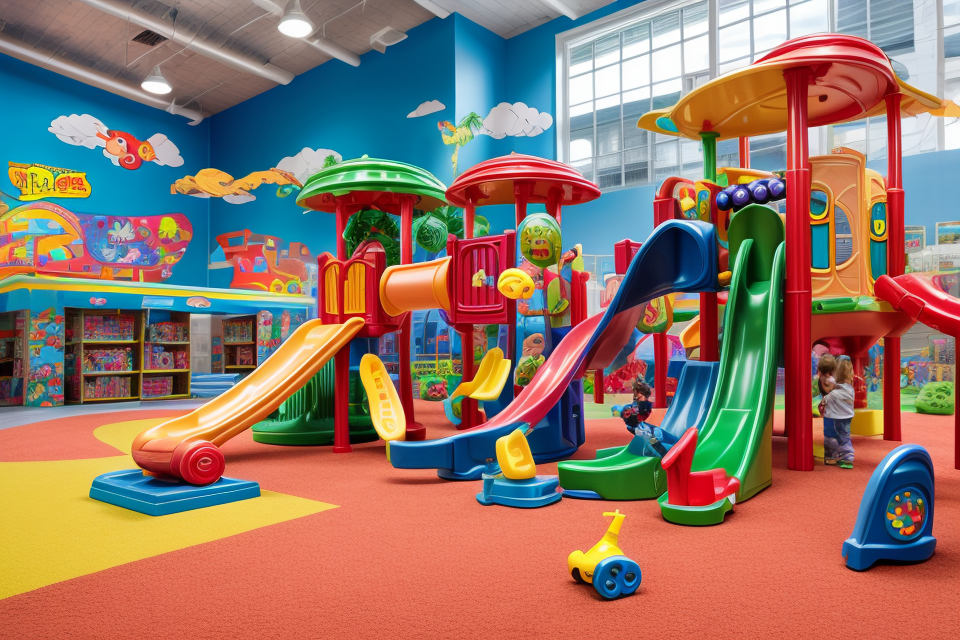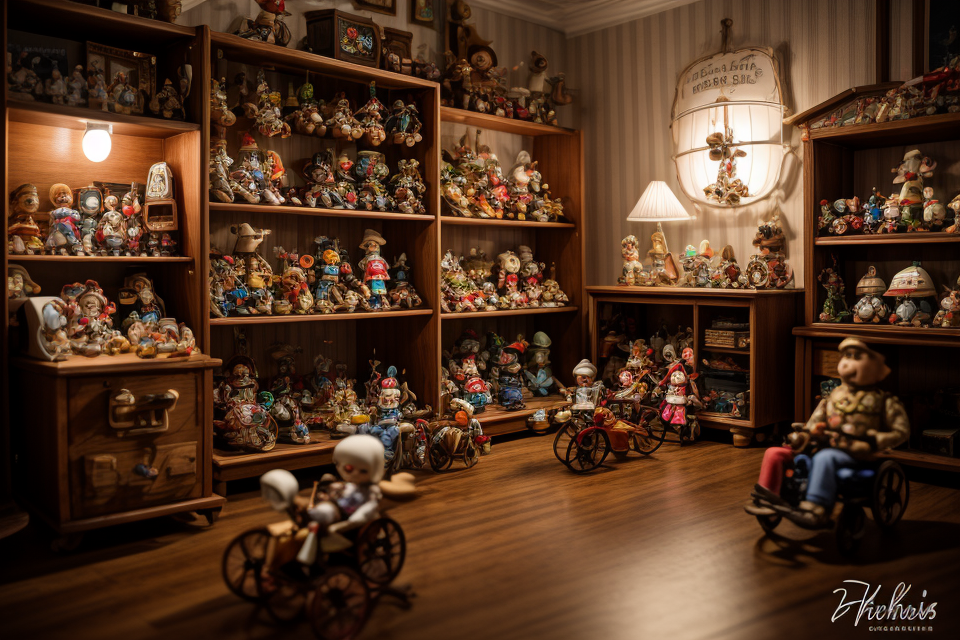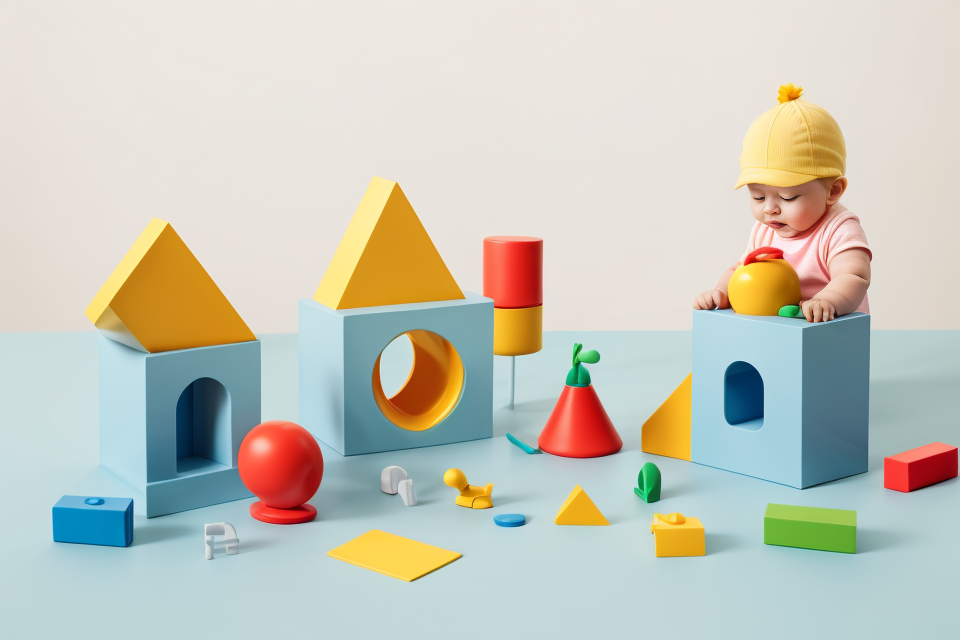Educational toys are a fantastic way to enhance your child’s learning and development. These toys are specifically designed to promote intellectual growth and stimulate young minds. They are a great alternative to traditional toys, as they encourage creativity, imagination, and problem-solving skills. Educational toys can also help children develop motor skills, hand-eye coordination, and fine motor skills. By incorporating educational toys into your child’s playtime, you can provide them with a fun and engaging way to learn and grow.
Educational toys can enhance a child’s learning and development by providing a fun and interactive way for them to explore new concepts and skills. These toys often encourage imaginative play, problem-solving, and creativity, all of which can help to build a child’s cognitive abilities and understanding of the world around them. Additionally, educational toys can help to develop a child’s fine motor skills, hand-eye coordination, and dexterity, as well as their social and emotional skills through play with others. By selecting age-appropriate educational toys, parents can provide their children with a valuable learning tool that can help to stimulate their curiosity and encourage their development in a variety of areas.
What are Educational Toys?
Definition and Characteristics
Educational toys are specially designed to promote learning and development in children through play. These toys are often intended to be interactive and engaging, encouraging children to explore, experiment, and discover new concepts and skills.
One of the key characteristics of educational toys is their focus on specific learning objectives. These toys are designed to help children develop particular skills or knowledge, such as cognitive, social, emotional, or physical abilities. They may be designed to teach specific subjects, such as math, science, or language, or to promote more general skills like problem-solving, creativity, or critical thinking.
Another important characteristic of educational toys is their ability to adapt to the needs and abilities of individual children. Good educational toys are designed to be age-appropriate and to provide a range of challenges and opportunities for different skill levels. They may be designed to be used in a variety of ways, allowing children to explore and experiment with different approaches and strategies.
In addition, educational toys often incorporate elements of play and fun, making them more engaging and enjoyable for children. They may use storytelling, imaginative play, or other interactive elements to keep children interested and motivated.
Overall, the goal of educational toys is to provide a stimulating and supportive environment for children’s learning and development, helping them to build important skills and knowledge in a fun and engaging way.
Types of Educational Toys
There are various types of educational toys that can benefit your child’s learning and development. Some of the most common types include:
- Puzzles: Puzzles are great for developing problem-solving skills, hand-eye coordination, and fine motor skills. They can also improve cognitive abilities and help children learn to think logically.
- Building toys: Building toys, such as blocks and Legos, help children develop spatial reasoning and problem-solving skills. They also encourage creativity and imagination.
- Role-playing toys: Role-playing toys, such as dress-up clothes and play kitchen sets, help children develop social skills and creativity. They also encourage imaginative play and can help children learn about different roles and professions.
- STEM toys: STEM toys, such as science kits and robotics sets, help children develop an interest in science, technology, engineering, and math. They also encourage critical thinking and problem-solving skills.
- Board games: Board games are great for developing social skills, strategy, and critical thinking. They can also help children learn about different subjects, such as history and geography.
- Arts and crafts supplies: Arts and crafts supplies, such as paints, markers, and clay, help children develop creativity and fine motor skills. They also encourage self-expression and can help children learn about different art techniques and styles.
Each type of educational toy has its own unique benefits and can help your child learn and develop in different ways. By providing a variety of educational toys, you can help your child develop a wide range of skills and interests.
Benefits of Educational Toys
Cognitive Development
Educational toys play a vital role in the cognitive development of children. These toys can improve various cognitive skills such as problem-solving, critical thinking, memory, and attention. Here are some specific skills that can be developed through play:
- Problem-solving: Educational toys that require children to figure out how to use them or solve a problem can help develop their problem-solving skills. For example, building blocks, puzzles, and board games can all help children develop their problem-solving abilities.
- Critical thinking: Toys that encourage children to think creatively and critically, such as brainteasers, can help them develop their critical thinking skills.
- Memory: Toys that involve remembering rules, patterns, or sequences, such as memory games, can help children improve their memory skills.
- Attention: Toys that require focus and concentration, such as puzzles or building sets, can help children develop their attention skills.
By playing with educational toys, children can practice these skills and improve their cognitive abilities. This can lead to better academic performance and a stronger foundation for future learning.
Emotional Development
Educational toys can play a significant role in the emotional development of children. Through play, children can learn to express their emotions, develop empathy, and gain self-confidence. Here are some ways in which educational toys can contribute to the emotional development of children:
Expressing Emotions
Educational toys provide children with a safe and engaging way to express their emotions. When children play with toys, they can act out scenarios that allow them to process and understand their feelings. For example, a child may use a stuffed animal to express sadness or frustration, which can help them learn to cope with their emotions in a healthy way.
Developing Empathy
Educational toys can also help children develop empathy by encouraging them to consider the feelings and perspectives of others. For example, a child may play with a doll that represents a friend or family member, which can help them understand how others might feel in different situations. This type of play can also foster cooperative play and social skills, as children learn to work together and take turns.
Building Self-Esteem
Finally, educational toys can help children build self-esteem by providing opportunities for success and positive reinforcement. When children achieve a goal or complete a task with a toy, they receive a sense of accomplishment and pride. This can help boost their confidence and self-worth, which is essential for healthy emotional development.
In conclusion, educational toys can have a significant impact on the emotional development of children. By providing opportunities for expression, empathy, and self-esteem building, these toys can help children navigate their emotions and develop healthy relationships with others.
Social Development
Educational toys can play a crucial role in promoting social skills in children. Through play, children learn how to build relationships, cooperate, and communicate with others.
Building Relationships
Educational toys provide children with opportunities to interact with others, building relationships and fostering social connections. Playing with others allows children to develop empathy, understanding, and cooperation, all of which are essential for building positive relationships.
Cooperative Play
Educational toys also encourage cooperative play, which is essential for children’s social development. When children play together, they learn to share, take turns, and work towards a common goal. This type of play helps children develop teamwork skills, build trust, and learn how to negotiate and resolve conflicts.
Communication Skills
Finally, educational toys can help children develop communication skills. Through play, children learn how to express themselves, listen to others, and understand different perspectives. They also learn how to negotiate, persuade, and negotiate conflict resolution. These skills are essential for building positive relationships and contributing to a child’s overall social development.
Overall, educational toys provide children with opportunities to develop social skills that are essential for success in school and in life. Through play, children learn how to build relationships, cooperate, and communicate with others, setting them up for success in all areas of their lives.
Physical Development
Educational toys can play a crucial role in supporting a child’s physical development. They encourage movement, coordination, and fine motor skills, which are essential for a child’s growth and development.
Some examples of educational toys that promote physical development include:
- Building blocks: Building blocks are an excellent way to promote physical development in children. They encourage the use of fine motor skills as children manipulate and stack the blocks. Additionally, building blocks can improve hand-eye coordination and problem-solving skills.
- Puzzles: Puzzles are another excellent way to promote physical development in children. They encourage the use of fine motor skills as children fit the pieces together. Additionally, puzzles can improve hand-eye coordination, problem-solving skills, and cognitive development.
- Playdough: Playdough is a fun and simple way to promote physical development in children. It encourages the use of fine motor skills as children manipulate and mold the dough. Additionally, playdough can improve hand-eye coordination and creativity.
Overall, educational toys that promote physical development can help children develop the necessary skills for physical activity and coordination, which are essential for their overall growth and development.
Choosing the Right Educational Toys
Factors to Consider
When choosing educational toys for your child, it is important to consider several factors to ensure that the toys are both engaging and developmentally appropriate. Here are some key factors to keep in mind:
- Age appropriateness: The toy should be designed for children within your child’s age range. Toys that are too advanced may be frustrating, while those that are too simple may not provide enough of a challenge.
- Interests and abilities: Consider your child’s interests and abilities when selecting educational toys. If your child is interested in animals, look for toys that feature animals, such as a puzzle or a stuffed animal. If your child is developing language skills, choose toys that encourage verbal expression, such as a talking doll or a game that requires communication.
- Play value: The toy should be fun and engaging for your child. Children are more likely to play with toys that they enjoy, which will increase the likelihood of learning and development.
- Quality: Choose toys made from high-quality materials that are safe and durable. Cheaply made toys may break easily, which can be frustrating for your child and potentially dangerous if small parts are swallowed.
- Educational value: Look for toys that provide an educational benefit, such as teaching basic skills or encouraging creativity and imagination.
By considering these factors, you can choose educational toys that will provide your child with a fun and engaging learning experience.
Age-Appropriate Toys
Age-appropriate toys are crucial for a child’s learning and development as they are designed to meet the specific needs and abilities of children within a particular age range. By selecting toys that are appropriate for your child’s age, you can help them to develop their cognitive, physical, and emotional abilities in a way that is both enjoyable and engaging.
When choosing educational toys for your child, it is important to consider their age, interests, and abilities. For example, toddlers may benefit from simple toys that encourage exploration and imaginative play, such as building blocks or puzzles. Older children may enjoy more complex toys that challenge their problem-solving skills, such as science kits or computer programming games.
It is also important to consider the durability and safety of the toys you choose. Educational toys should be made from high-quality materials that can withstand frequent use and play. They should also be safe for your child to use and free from any small parts or other hazards that could cause harm.
In the following sections, we will provide a list of recommended educational toys for different age groups. These toys are designed to help your child learn and develop in a fun and engaging way, and are sure to provide hours of entertainment and enjoyment.
Integrating Educational Toys into Playtime
Tips for Maximizing Learning
When incorporating educational toys into your child’s playtime, there are several tips to consider in order to maximize their learning and development. Here are some effective strategies:
- Encourage Open-Ended Play:
- One of the most effective ways to promote learning through educational toys is by encouraging open-ended play. This type of play allows children to use their imagination and creativity, which fosters cognitive development and problem-solving skills.
- Open-ended play also provides an opportunity for children to explore different interests and learn through trial and error. It allows them to develop a sense of curiosity and discover new things on their own, which can enhance their motivation to learn.
- To encourage open-ended play, parents can provide their children with toys that are versatile and have multiple uses. For example, building blocks, puzzles, and art supplies are all great options that can be used in various ways and promote creative thinking.
- Provide Different Types of Toys:
- Introducing a variety of educational toys can help children develop different skills and interests. By providing a range of toys, parents can support their child’s overall development and encourage them to explore different areas of learning.
- For example, providing puzzles, building blocks, and action figures can help children develop problem-solving skills, hand-eye coordination, and creativity, respectively. Additionally, introducing educational games, books, and apps can support language development, literacy skills, and cognitive abilities.
- By providing a variety of toys, parents can also help their children discover their strengths and interests, which can help guide their future learning and development.
- Engage in Play with Your Child:
- Another effective strategy for maximizing learning through educational toys is by engaging in play with your child. Playing with your child not only helps build a strong bond, but it also provides an opportunity for parents to model learning and support their child’s development.
- By participating in play with your child, parents can help extend their learning by asking questions, providing feedback, and offering new ideas. This type of interactive play can also help children develop social skills, such as communication, cooperation, and empathy.
- Parents can also use playtime as an opportunity to introduce new concepts and ideas, such as science experiments or language games, which can enhance their child’s learning and development.
- Encourage Social Interaction:
- Finally, educational toys can also provide opportunities for social interaction, which is important for children’s social and emotional development. By encouraging play with other children, parents can help their child develop important social skills, such as sharing, taking turns, and cooperating.
- Playdates, playgroups, and other social activities can provide opportunities for children to interact with others and develop important social skills. Additionally, some educational toys, such as board games and puzzles, can be played with multiple children, providing a collaborative learning experience.
By incorporating these tips into playtime with educational toys, parents can maximize their child’s learning and development, fostering creativity, problem-solving skills, and social interaction.
Incorporating Educational Toys into Learning
Integrating educational toys into learning activities can provide children with a hands-on approach to learning and enhance their understanding of different subjects. By incorporating educational toys into learning, children can develop problem-solving skills, critical thinking, and creativity. Here are some ideas for using toys to support learning in different subjects:
Science
- Physics: Building blocks and ramps can be used to demonstrate principles of physics such as gravity, force, and motion.
- Biology: Educational toys such as microscope kits can be used to explore the world of living organisms and learn about cells, bacteria, and plants.
- Chemistry: Kits that involve experiments with chemical reactions can help children learn about chemical reactions, elements, and the periodic table.
Math
- Numbers and Counting: Counting toys such as stacking cups, blocks, and sorting games can help children learn numbers, counting, and basic math concepts.
- Measurement: Toys such as measuring tape, rulers, and balance scales can be used to teach children about measurement and proportions.
- Shapes and Geometry: Toys such as puzzles, tangrams, and shape sorters can help children learn about shapes, patterns, and geometry.
Language and Literacy
- Phonics: Toys such as letter puzzles, phonics games, and talking books can help children learn the sounds of letters and build their vocabulary.
- Reading: Toys such as storybooks, reading cards, and word games can help children develop reading skills and build their comprehension and fluency.
- Writing: Toys such as magnetic letters, dry-erase boards, and writing tools can help children learn the formation of letters and practice writing.
Social Studies
- Geography: Toys such as puzzle maps, globe toys, and landmark building blocks can help children learn about different countries, continents, and landmarks.
- History: Educational toys such as historical figures, time machines, and storybooks can help children learn about important events and people in history.
- Culture: Toys such as musical instruments, art supplies, and dress-up clothes can help children learn about different cultures and traditions.
Incorporating educational toys into learning activities can make the learning process more enjoyable and engaging for children. It also helps to create a connection between playtime and learning, making it easier for children to see the value of education in their daily lives.
FAQs
1. What are educational toys?
Educational toys are toys that are designed to promote learning and development in children. They can be toys that teach specific skills, such as math or reading, or toys that encourage imaginative play and creativity.
2. How can educational toys enhance my child’s learning and development?
Educational toys can enhance your child’s learning and development in a number of ways. They can help your child develop important skills, such as problem-solving, critical thinking, and creativity. They can also help your child learn about specific subjects, such as science or history. Additionally, educational toys can help your child develop important social and emotional skills, such as communication and cooperation.
3. What are some examples of educational toys?
There are many different types of educational toys available. Some examples include building sets, puzzles, art supplies, and dolls. These toys can be used to teach specific skills, such as math or reading, or to encourage imaginative play and creativity.
4. When is the best time to introduce educational toys to my child?
It is never too early to introduce educational toys to your child. Even infants can benefit from toys that encourage sensory play and exploration. As your child grows and develops, you can introduce more complex educational toys to help them learn and grow.
5. How can I choose the right educational toys for my child?
When choosing educational toys for your child, it is important to consider their age, interests, and developmental needs. Look for toys that are appropriate for your child’s age and skill level, and that encourage imaginative play and creativity. It can also be helpful to read reviews and ask for recommendations from other parents.



